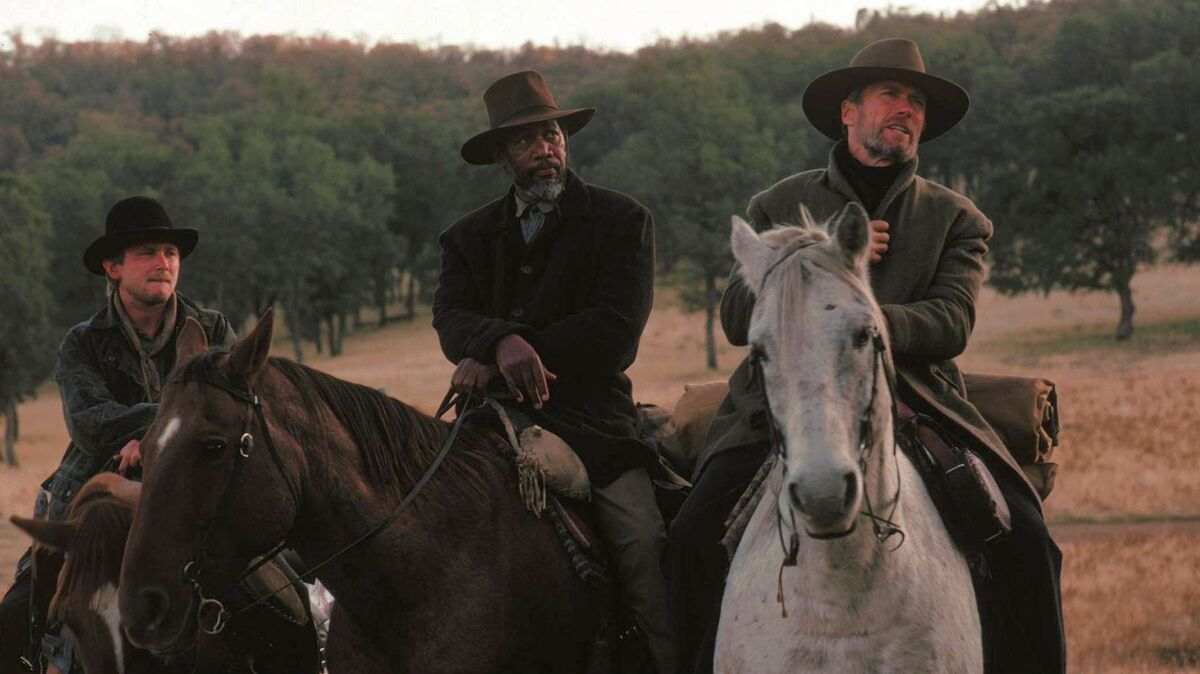Clint Eastwood is an iconic figure in the world of cinema, known for his steely gaze, rugged demeanor, and exceptional talent both in front of and behind the camera. While he initially gained fame for his roles in spaghetti westerns like “The Good, the Bad, and the Ugly” and as the iconic Man with No Name, Eastwood’s filmography is far more diverse than his cowboy persona suggests.
Clint Eastwood revolutionized Western filmmaking by challenging the genre’s conventions. His portrayal of morally ambiguous characters like the Man with No Name in Sergio Leone’s “Dollars Trilogy” broke the mold of the traditional hero. Eastwood’s stoic, anti-heroic persona reshaped Western protagonists, making them more complex and relatable. Furthermore, his directorial ventures, notably “Unforgiven,” deconstructed Western myths, exposing the grim realities of frontier life. Eastwood’s willingness to explore darker themes and nuanced characters reinvigorated the genre, influencing subsequent Westerns and paving the way for a new era of storytelling in the American West. His impact on Western filmmaking remains profound and enduring.
In this article, we’ll explore the top 10 Clint Eastwood films that break away from the straightforward western genre, showcasing his versatility as an actor and director.
Unforgiven (1992)
“Unforgiven” is often considered Clint Eastwood’s magnum opus and a masterpiece in the revisionist western genre. While it does have western elements, it transcends the genre by deconstructing the myth of the Old West and portraying the brutality and consequences of violence. Eastwood plays William Munny, a retired outlaw turned farmer, in a gripping tale of redemption and revenge.
Gran Torino (2008)
In “Gran Torino,” Eastwood portrays Walt Kowalski, a Korean War veteran and retired auto worker who forms an unlikely friendship with a young Hmong boy. The film delves into themes of racism, community, and redemption in a contemporary setting, showcasing Eastwood’s talent for compelling drama.
Mystic River (2003)
Directed by Eastwood, “Mystic River” is a haunting crime drama based on Dennis Lehane’s novel. The film explores the dark secrets and the impact of a traumatic childhood event on three friends who are brought back together by a tragic incident. Eastwood’s direction and the ensemble cast’s performances make it a standout in his filmography.
Million Dollar Baby (2004)
“Million Dollar Baby” is another gem in Eastwood’s directorial career. The film revolves around an unlikely boxing coach-athlete relationship and delves into themes of determination, sacrifice, and the human spirit. Eastwood, who also stars in the film, won an Academy Award for Best Director for his work on this emotionally charged drama.
Dirty Harry (1971)
“Dirty Harry” introduced audiences to Eastwood’s iconic character, Detective Harry Callahan, a tough-as-nails cop willing to bend the rules to catch criminals. This gritty crime thriller set the tone for many action films to come and established Eastwood as an action star beyond the western genre.
Play Misty For Me (1971)
“Play Misty for Me” marked Eastwood’s directorial debut, and it is a psychological thriller that takes a departure from the westerns he was known for at the time. Eastwood plays a radio disc jockey stalked by an obsessed fan. The film is a suspenseful exploration of obsession and its consequences.
Bird (1988)
Eastwood directed the biographical film “Bird,” which tells the story of jazz saxophonist Charlie Parker. This film showcases Eastwood’s ability to handle diverse subject matter and demonstrates his commitment to honoring the life and art of a legendary figure in American music.
Flags Of Our Fathers (2006)
As both director and producer, Eastwood explored the complexities of war and heroism in “Flags of Our Fathers.” The film is based on the true story of the Battle of Iwo Jima and its aftermath, focusing on the lives of the soldiers who raised the American flag. It offers a poignant look at the blurred lines between heroism and propaganda.
Letters From Iwo Jima (2006)
Released the same year as “Flags of Our Fathers,” “Letters from Iwo Jima” presents the Battle of Iwo Jima from the perspective of the Japanese soldiers. Eastwood’s direction provides a nuanced portrayal of the enemy, emphasizing the shared humanity of soldiers on both sides of the conflict.
Changeling (2008)
“Changeling” is a period drama directed by Eastwood, based on the true story of a woman who, in the 1920s, faced police corruption and a horrifying cover-up after her son goes missing. The film is a gripping tale of a mother’s unwavering determination to uncover the truth, and Eastwood’s direction and Angelina Jolie’s performance make it a standout.
Final Words
While Clint Eastwood will forever be associated with his iconic western roles, his filmography extends far beyond that genre. These ten films showcase his incredible versatility as both an actor and director, tackling a wide range of themes and genres, from gritty crime thrillers to emotionally charged dramas and thought-provoking war films. Clint Eastwood’s enduring cinematic legacy is a testament to his talent and the depth of his contributions to the world of film.












